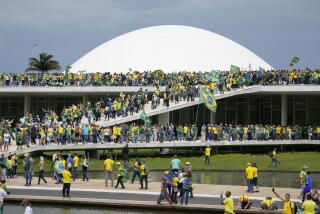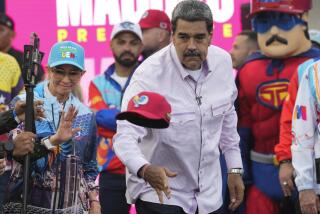Colombia reactivates arrest orders for top rebels blamed for deadly violence in cocaine turf war

- Share via
BOGOTA, Colombia — Colombia’s government is reactivating arrest orders for the top leadership of the nation’s largest rebel group following attacks on civilians as part of a deadly turf war with dissident guerrillas from another armed group for control of a coca-growing region bordering Venezuela.
President Gustavo Petro’s leftist government in 2022 suspended warrants against top commanders of the National Liberation Army, or ELN, as part of an effort to coax the 60-year-old insurgency into a peace deal.
Among the 31 rebel leaders whose arrest was ordered Wednesday by the chief prosecutor’s office is Pablo Beltrán, the lead ELN negotiator in those halting peace talks, as well as the group’s top military commander, best known by his alias, Antonio García.
Petro — himself a former member of the M-19 guerrilla group — has also suspended the peace talks in response to the violence.
At least 80 people have been killed and thousands more displaced in Colombia’s Catatumbo region in the past week as fighting intensifies between the ELN and holdouts from the Revolutionary Armed Forces of Colombia, or FARC, a guerrilla group that largely disbanded after signing a peace deal in 2016 with the government.
Some of the estimated 18,000 displaced people have fled into Venezuela.
The armed groups are fighting over control of strategic drug routes that have been fueling a boom in cocaine production from Colombia in recent years.
It’s not clear what upset the delicate truce between the groups, which rely on the drug trade to fund their insurgencies. Some analysts believe the Cuban revolution-inspired ELN has been losing strength in its historic stronghold in northeastern Colombia as the FARC dissidents expand their influence.
More to Read
Sign up for Essential California
The most important California stories and recommendations in your inbox every morning.
You may occasionally receive promotional content from the Los Angeles Times.










